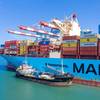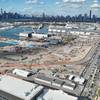Beijing's bid to move polluting firms adds pressure on nearby regions
China's capital has ordered more than 50 companies to shut down this year in an effort to cut pollution but pushing factories out could raise objections in surrounding areas reluctant to host Beijing's polluters.
Smog-shrouded Beijing and the surrounding province of Hebei have become a front in a "war against pollution" declared by Premier Li Keqiang last month.
But experts say efforts to cut coal consumption and industrial output in big cities like Beijing is likely to put pressure on other regions to endure more pollution to keep the economy growing, with overall coal consumption expected to rise by a quarter from 2011 to 2015.
"Moving Beijing's plants to Hebei isn't the best way," said Yang Fuqiang, a former government researcher and senior energy and environment adviser with the Natural Resources Defense Council, a U.S.-based think-tank.
"They have to move much further away to western or central China, where manufacturing needs to be developed and where local economic problems are much more immediate," Yang said.
According to Beijing authorities, the city has ordered 53 enterprises to relocate factories producing steel, heavy machinery and chemicals, and will pay them 90.5 million yuan ($14.55 million) in compensation.
The number of closures for the whole of the year could eventually reach 500, the official People's Daily newspaper reported this week, citing Zhang Boxu, the head ofBeijing's economic commission.
On the list are ageing steel processing facilities owned by the Shougang Group, one of China's biggest steel firms which moved most of its production to Hebeiprovince before the Olympic Games in 2008.
A pharmaceutical plant owned by the Xinxing Cathay International Group, a Fortune 500 firm, will relocate after it signed an agreement with the city of Handan in Hebeiprovince.
The Xinhua news agency said on Thursday that moving the pharmaceutical plant would cut Beijing's carbon dioxide emissions by 400,000 tonnes a year, sulphur dioxide emissions by 9,000 tonnes and dust by 10,000 tonnes.
The company was not available for comment on Thursday but an official with the Handan city government confirmed the move.
OPPOSITION
The official said that the new facilities were not expected to add to the environmental pressures facing the city, the location of dozens of small, private steel mills, because the company would use surplus energy produced by nearby enterprises.
However, authorities in Hebei, already under pressure to reduce emissions, have expressed concern that they are being asked to take in some of Beijing's dirtiest enterprises.
The government in Langfang city has expressed opposition to a plan to move some of Beijing's "low-end" industry there, Xinhua reported this week, a strategy the news agency described as "beggar thy neighbour".
Yang of the NRDC said relocated firms needed to be encouraged to use the proceeds from selling property in Beijing to upgrade technologies and set higher environmental standards.
The government is hoping to create an integrated "economic circle" with Beijing at its centre, the National Development and Reform Commission, China's top planning agency, announced this week.
Authorities in Hebei are hoping the plan will give the province more incentive to shut its old polluting industries like steel and cement and develop more modern, cleaner enterprises.
According to the Beijing Daily newspaper, the capital is planning to move as many as 5 million of its residents to Hebei, with the aim of capping total population at 18 million by 2020.
State media reported last month that Beijing was also planning to transfer some government functions to the city of Baoding in Hebei.
About a third of Beijing's smog comes from outside the city, prompting authorities to encourage the whole region to cut emissions.
"In my opinion, any industrial reform in Beijing-Tianjin-Hebei should obey one rule - the reduction in total pollutant emissions," said Huang Wei, campaigner in Beijingwith environmental group Greenpeace.
(Additional reporting by Stian Reklev, Kathy Chen and Beijing newsroom; Editing by Robert Birsel)
($1 = 6.2214 Chinese Yuan)















